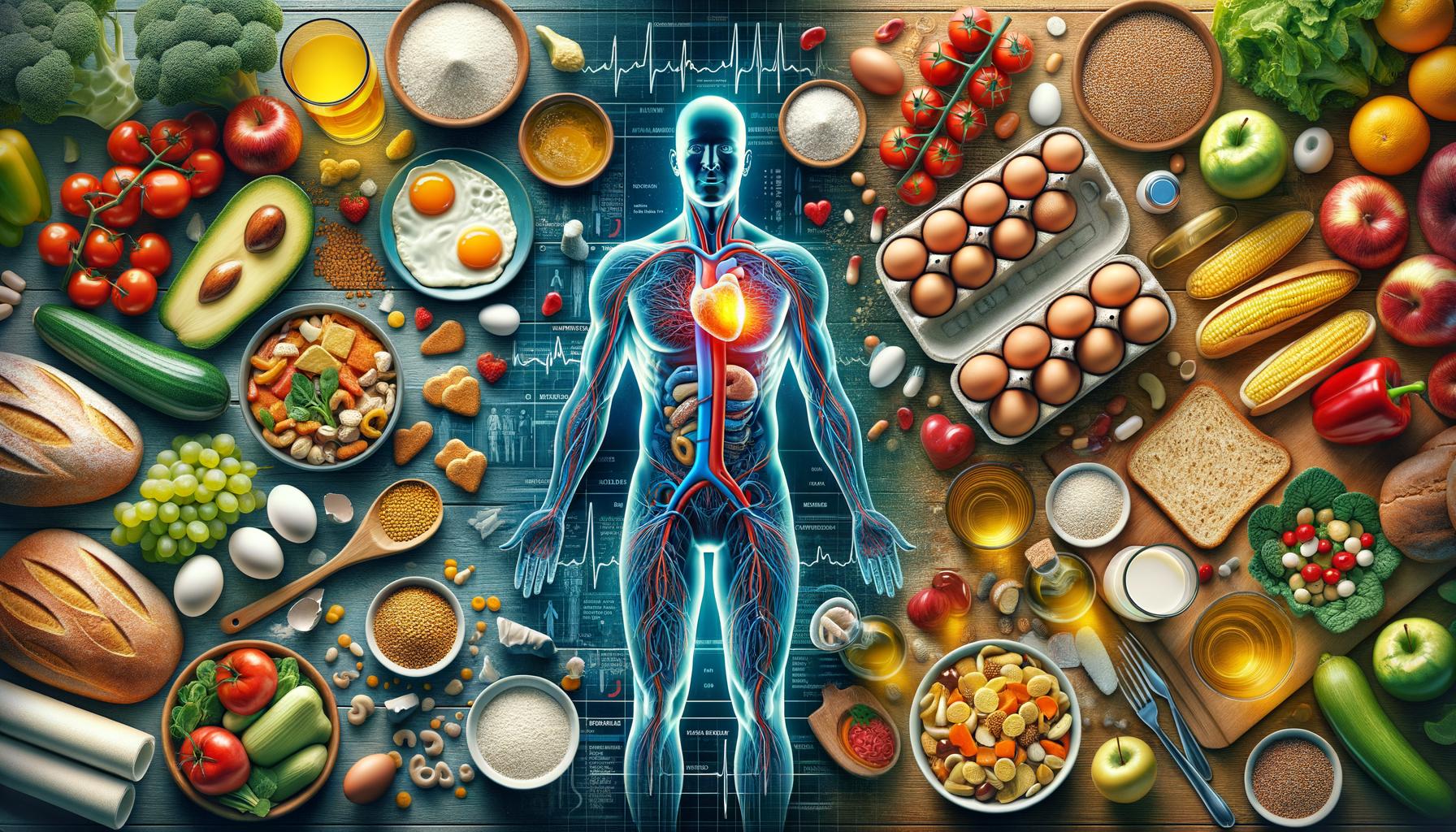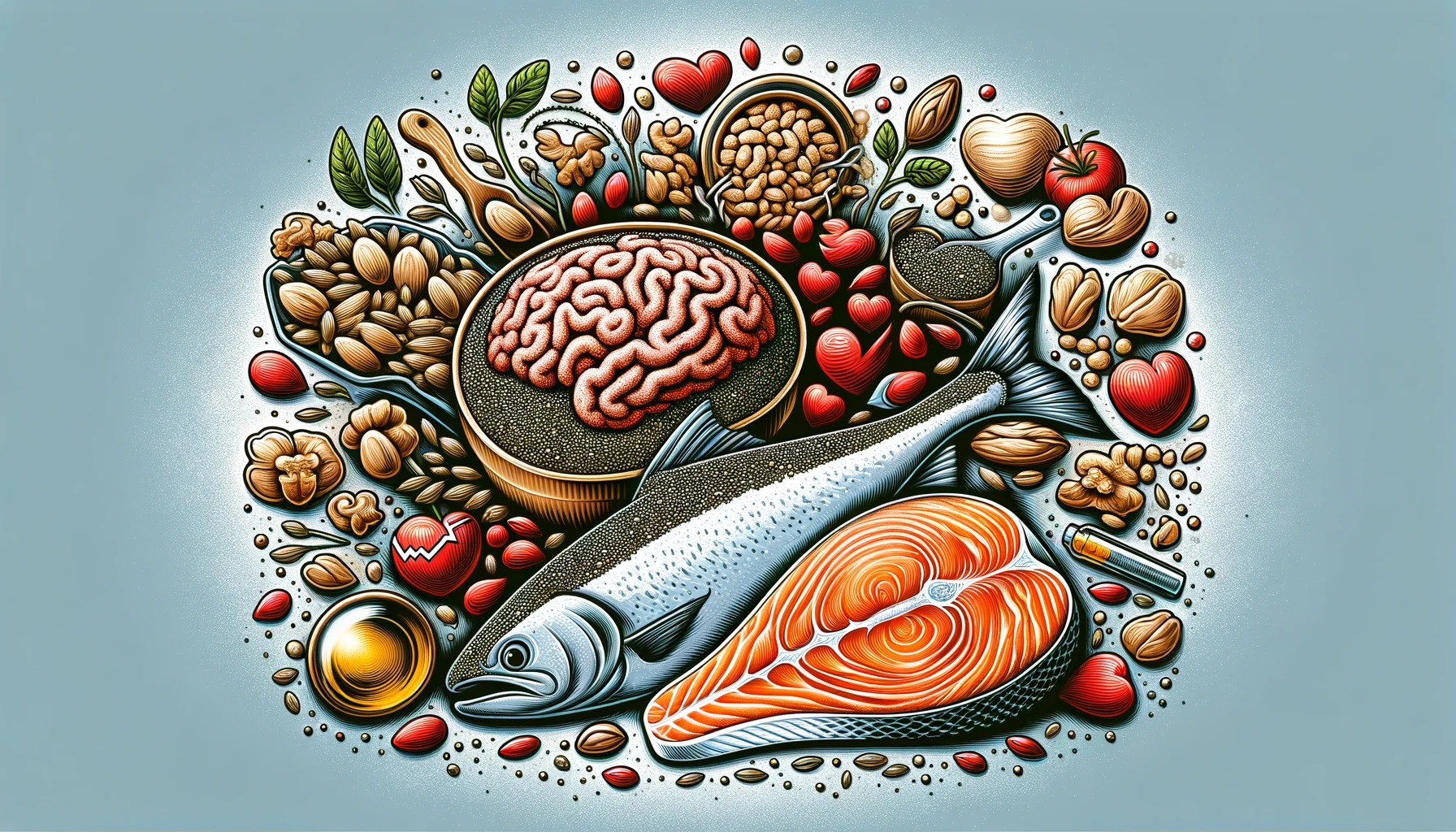· nutrition · 16 min read
Reevaluating Eggs: Dietary Cholesterol Myths
This article delves into the ongoing debate surrounding dietary cholesterol, with a focus on eggs, and aims to clarify misconceptions, presenting recent research findings to provide a more informed perspective on heart health and cholesterol levels.

In This Post
The Fact Why Should I Care How To Put In Action Start Tomorrow Guide How does it effect my ability to focus How does it impact my daily life How does it help me make friends How does it help me manage stress How does it effect my mood Summary: Remember Refresher Checklist The Full Research Article CitationsPrint Out The Tomorrow Checklist!
Sign up for our newsletter and receive a copy today, so that, you can start tomorrow! Or the next day, or the day after that. I forget everything and starting things is hard at least for me so these checklists are godsend.
Print Out The Remember Refresher Checklist!
Sign up for our newsletter and download your own copy of the Remember Refresher Checklist, so that, you can easily put it on your fridge and help you stay on target towards your WHY. Every little bit helps.
The Dietary Cholesterol Debate
For years, the mention of cholesterol, particularly in relation to diet, has conjured images of blocked arteries, heart attacks, and a plethora of heart-related ailments. This has led to a significant portion of the population shunning foods high in dietary cholesterol, with eggs often at the forefront of this dietary aversion.
The crux of the matter lies in the belief that high intake of dietary cholesterol straightforwardly translates to elevated blood cholesterol levels, thereby increasing the risk of heart disease. However, this simplistic view overlooks the complexity of cholesterol metabolism and the body’s intricate systems for regulating cholesterol levels irrespective of dietary intake. Recent scientific studies have started to paint a more nuanced picture, suggesting that the link between dietary cholesterol, specifically from eggs, and heart disease risk may not be as straightforward as previously thought.
- Understand the basic concept of dietary cholesterol
- Recognize eggs as a central focus in the dietary cholesterol debate
- Acknowledge the historical belief connecting dietary cholesterol to heart disease
- Realize the complexity of cholesterol metabolism
- Be aware of the shift in scientific perspective regarding dietary cholesterol and heart disease risk
The narrative surrounding eggs and cholesterol has always been a topic of hot debate among nutritionists, dieticians, and health enthusiasts alike. As we delve deeper into this discussion, it becomes imperative to distinguish between outdated myths and updated evidence to guide our dietary choices effectively.
Purpose and Scope of the Article
The primary aim of this article is to revisit the longstanding debate surrounding dietary cholesterol, with a keen focus on eggs - a food item that has been, more often than not, unjustly vilified. By examining up-to-date scientific literature and studies, this article aspires to dispel prevalent myths and shed light on the actual impact of dietary cholesterol on blood levels and heart disease risk.
By contextualizing the role of eggs within a balanced diet, we strive to provide readers with a clearer understanding of how dietary cholesterol interacts with the body’s physiological mechanisms. This exploration is crucial for those seeking to make informed dietary choices, specifically in relation to cardiovascular health and managing cholesterol levels.
In doing so, the article will:
- Break down complex scientific findings into accessible information
- Re-evaluate the role of dietary cholesterol in cardiovascular health
- Offer practical advice for incorporating eggs and other cholesterol-containing foods into a heart-healthy diet
The insights provided herein aim to empower individuals with the knowledge to navigate the intricacies of healthy eating, cardiovascular wellness, and overall lifestyle choices, especially regarding dietary cholesterol and egg consumption.
Understanding Cholesterol
What is Cholesterol, and Why is it Important?
Cholesterol is a waxy substance found in the blood, vital for building healthy cells, producing certain hormones, and synthesizing vitamin D among other critical physiological roles. Contrary to common belief, cholesterol itself isn’t inherently bad. However, its balance is crucial; too much cholesterol, especially of certain types, can lead to health issues, including heart disease.
The body produces cholesterol, but it’s also introduced into the system through the consumption of animal-based foods, such as meat, dairy, and eggs. This relationship between dietary cholesterol and blood cholesterol levels has been a point of significant debate, especially regarding its impact on cardiovascular health.
Types of Cholesterol: LDL vs. HDL
Cholesterol is carried through your bloodstream by lipoproteins. Two types, in particular, play key roles in the discussion about cardiovascular risk:
- Low-Density Lipoprotein (LDL): Often referred to as “bad” cholesterol, LDL contributes to the buildup of fatty deposits within your arteries, reducing or blocking blood flow, and significantly increasing the risk of heart disease and stroke.
- High-Density Lipoprotein (HDL): Known as “good” cholesterol, HDL helps remove other forms of cholesterol from your bloodstream. Higher levels of HDL are associated with a lower risk of heart disease.
Understanding the roles and impacts of LDL and HDL is fundamental in navigating the complexities of dietary cholesterol and overall cardiovascular health.
How the Body Regulates Cholesterol Levels
The body employs a sophisticated mechanism to regulate cholesterol levels, ensuring they remain within a healthy range. Key processes include:
- Cholesterol Production: The liver produces the majority of the body’s cholesterol, adjusting its output based on dietary intake.
- Dietary Absorption: While the body can adjust cholesterol production based on dietary consumption, an excessively cholesterol-rich diet can overwhelm this balance, potentially leading to elevated blood cholesterol levels.
- Cholesterol Utilization: The body uses cholesterol for various processes, including hormone production and cellular structure. Excess cholesterol can be repurposed or excreted.
- Cholesterol Excretion: The liver also plays a crucial role in excreting excess cholesterol from the body, primarily through the digestive system.
Maintaining cholesterol balance is a dynamic interplay between production, dietary intake, utilization, and excretion. Lifestyle choices, including diet, exercise, and smoking cessation, can significantly influence this balance.
Checklist for Maintaining Healthy Cholesterol Levels
- Monitor Your Diet: Limit intake of foods high in LDL (bad) cholesterol and increase those rich in HDL (good) cholesterol.
- Exercise Regularly: Physical activity can help raise HDL cholesterol levels.
- Avoid Tobacco Smoke: Smoking cessation improves HDL cholesterol levels and benefits overall heart health.
- Regular Health Check-ups: Keeping track of your cholesterol levels through regular check-ups helps in early detection and management.
- Manage Weight: Achieving and maintaining a healthy weight can help regulate cholesterol levels and reduce the risk of cardiovascular diseases.
Understanding cholesterol’s function, the distinction between its types, and the body’s regulation mechanisms provides a foundation for addressing the often misunderstood relationship between dietary cholesterol and heart health.
Unraveling the Myth of Dietary Cholesterol
Historical Perspective on Dietary Cholesterol and Heart Disease
For decades, dietary guidelines around the world painted a simplistic picture: cholesterol in your food directly translates to cholesterol in your bloodstream, thereby increasing the risk of heart disease. The origins of this belief can be traced back to research from the mid-20th century, which seemed to show a direct link between the consumption of high-cholesterol foods, such as eggs, and elevated levels of LDL or “bad” cholesterol in the blood.
However, this perspective failed to consider the body’s complex, regulatory mechanisms that balance cholesterol produced by the liver with dietary intake. Over the years, ensuing studies have consistently challenged the demonization of dietary cholesterol, revealing a far more nuanced reality.
Revisiting the Egg Debate: What Does Recent Research Say?
Recent research has drastically shifted the narrative surrounding eggs and dietary cholesterol. Large-scale observational studies and randomized controlled trials alike have shown that, for most people, consuming eggs does not significantly affect the levels of LDL cholesterol in the bloodstream or heighten the risk of heart disease. It turns out, the impact of dietary cholesterol from eggs on blood cholesterol levels is minimal when compared with the more potent effects of saturated and trans fats.
A notable turning point came with the Dietary Guidelines for Americans 2015-2020, which removed the previous limitation on dietary cholesterol, citing insufficient evidence for a blanket restriction. Consequently, eggs are now recognized not just for their protein quality but also for their rich content of vitamins, minerals, and anti-inflammatory omega-3 fatty acids.
Dietary Cholesterol vs. Saturated and Trans Fats Impact
While dietary cholesterol has been rehabilitated in recent nutritional science conversations, saturated and trans fats remain a concern. Unlike dietary cholesterol, these fats have a more prominent and detrimental effect on raising LDL cholesterol levels and promoting heart disease. Here’s how the impact of dietary cholesterol compares to that of saturated and trans fats:
Dietary Cholesterol: Found in foods like eggs, it has minimal impact on most individuals’ LDL cholesterol levels or heart disease risk.
Saturated Fats: Present in red meat, butter, and full-fat dairy products, these fats can significantly increase LDL cholesterol levels and risk of heart disease.
Trans Fats: Mostly found in processed foods, these fats not only raise LDL cholesterol but also lower HDL or “good” cholesterol, exacerbating heart disease risk.
Checklist for Managing Cholesterol through Diet:
- Limit intake of saturated fats by choosing lean meats, and opting for low-fat or fat-free dairy products.
- Avoid trans fats by steering clear of processed and fried foods.
- Include a variety of cholesterol-lowering foods in your diet, such as oats, nuts, and fatty fish rich in omega-3 fatty acids.
- Monitor and regulate egg consumption according to individual health conditions and dietary needs.
- Focus on a balanced diet rich in fruits, vegetables, whole grains, and healthy fats to support overall cardiovascular health.
Practical Advice for Consumers
The ongoing debates and research findings surrounding dietary cholesterol, particularly from eggs, have left many consumers puzzled about the place of such foods in a healthy diet. As science evolves, so does our understanding, leading to more nuanced advice tailored to individual health profiles and dietary habits. Here are practical guidelines for incorporating eggs into your diet responsibly and alternative strategies for those on low-cholesterol diets.
Safe Consumption of Eggs: How Much is Too Much?
While eggs are a nutrient-rich food, offering high-quality protein, vitamins, minerals, and antioxidants, the key to their consumption, as with most foods, is moderation. Given the mixed research findings, individuals without preexisting high cholesterol levels or heart disease risk factors can consider including eggs in their daily diets but should be mindful of the quantity and frequency.
- An average of one egg per day can be part of a healthy diet for most people.
- Those with cardiovascular disease, diabetes, or high LDL cholesterol levels might need to limit intake and consult with a healthcare provider for personalized advice.
Incorporating Eggs into a Heart-Healthy Diet
Eggs can be part of a heart-healthy diet when consumed wisely and not in isolation. Pairing eggs with other nutritious foods enriches your diet and helps balance overall fat and cholesterol intake.
- Include plenty of vegetables, whole grains, and fruits along with eggs to increase fiber intake, which can help manage cholesterol levels.
- Prepare eggs using healthier cooking methods such as boiling, poaching, or scrambling with minimal added fats.
- Consider the whole diet pattern rather than focusing solely on individual foods for optimal cardiovascular health.
Alternatives to Eggs for Low-Cholesterol Diets
For those specifically seeking to lower dietary cholesterol intake, plenty of egg alternatives offer similar nutritional benefits without the cholesterol content.
- Plant-based protein sources such as legumes, tofu, and quinoa.
- Egg substitutes made from egg whites are available in most grocery stores and provide protein without the yolk’s cholesterol.
- Fortified nutritional yeast can be a flavorful addition, offering vitamins and protein.
Reading Food Labels: Identifying Hidden Saturated and Trans Fats
A critical skill in managing cholesterol levels is the ability to read and understand food labels to identify hidden saturated and trans fats, which can have a more pronounced effect on blood cholesterol levels than dietary cholesterol from eggs.
Checklist for Reading Food Labels:
- Look for “partially hydrogenated oils” in the ingredients list — a source of trans fats.
- Pay attention to the saturated fat content, aiming for foods with lower amounts per serving.
- Be mindful of serving sizes to ensure accurate tracking of fat intake.
- Seek out products with labels such as “trans fat-free” and low in saturated fat.
Adopting a balanced approach to egg consumption and being vigilant about saturated and trans fat intake can help people lead a heart-healthy lifestyle without unnecessarily eliminating nutrient-rich foods like eggs. Always consider personal health conditions and consult with healthcare professionals to tailor dietary choices to individual needs.
FAQs (Based on “People Also Ask” Section from Google)
The exploration of dietary cholesterol, particularly from eggs, has led to numerous questions and debates among both health professionals and consumers. As we delve deeper into this topic, let’s address some frequently asked questions that reflect widespread concerns and curiosities regarding the impact of egg consumption on health.
Do Eggs Significantly Impact Blood Cholesterol Levels?
Contrary to the longstanding belief that egg consumption directly leads to high blood cholesterol levels, recent research suggests a more nuanced view. For most people, dietary cholesterol found in eggs has a minimal impact on their blood cholesterol levels. The body regulates its own cholesterol production, often balancing out the cholesterol derived from food. However, the effect can vary among individuals, with some being more sensitive to dietary cholesterol. These individuals, termed “hyper-responders,” might see a relatively higher impact on their blood cholesterol levels. Nonetheless, for the general population, eggs can be a part of a healthy diet without significantly affecting blood cholesterol levels.
Can Consuming Eggs Increase the Risk of Heart Disease?
Over the past decades, the link between egg consumption and heart disease risk has been extensively debated. Initial studies suggested a correlation between high dietary cholesterol intake and cardiovascular disease. However, more recent and comprehensive studies have found that for most people, eating eggs doesn’t significantly raise the risk of heart disease. The key is moderation. Eggs are a source of high-quality protein and other important nutrients like vitamin D and choline. When consumed as part of a varied diet, eggs can contribute to overall health without disproportionately raising the risk of heart disease.
How Do Saturated and Trans Fats Affect Blood Cholesterol More Than Dietary Cholesterol?
Saturated and trans fats have a more pronounced effect on blood cholesterol levels than dietary cholesterol itself. Unlike dietary cholesterol:
- Saturated fats: Found in red meat, butter, and dairy products, can raise total and LDL (bad) cholesterol levels, thereby increasing heart disease risk.
- Trans fats: Present in some fried and processed foods, are particularly harmful because they raise LDL cholesterol and lower HDL (good) cholesterol levels, further endangering cardiovascular health.
For individuals concerned about their heart health, focusing on reducing intake of saturated and trans fats is crucial. Adopting a diet low in these fats can help in managing blood cholesterol levels more effectively than merely avoiding dietary cholesterol.
---checklist
- Monitor your intake of saturated and trans fats, aiming to keep them as low as possible.
- Include a variety of nutrient-dense, whole foods in your diet to ensure you’re getting a balance of important nutrients.
- Don’t eliminate eggs from your diet based on cholesterol fears alone; consider their nutritional benefits and consume them in moderation.
- Always consult with a healthcare provider or a dietitian if you have specific health concerns or dietary needs.
Conclusion
Summary of Key Points
In the heart of our discussion on dietary cholesterol, specifically focusing on eggs, we have traversed through the evolving landscape of nutritional science. We revisited the old belief that positioned dietary cholesterol as a primary villain in cardiovascular health and the more recent evidence that contests this view. Let’s summarize the key points:
- Reevaluation of Dietary Cholesterol: The once firm belief in the direct causality between dietary cholesterol intake and increased blood cholesterol levels has been moderated with new research findings. It’s now understood that for most individuals, consuming foods high in dietary cholesterol, like eggs, does not significantly impact the levels of LDL (low-density lipoprotein) or “bad” cholesterol in the blood.
- The Role of Saturated and Trans Fats: Contrary to dietary cholesterol, saturated and trans fats have a more pronounced effect on blood cholesterol levels. Limiting these fats is crucial in maintaining cardiovascular health and preventing heart disease.
- Nutritional Value of Eggs: Eggs are a nutrient-rich food, providing high-quality protein, essential vitamins, and minerals, including omega-3 fatty acids which are beneficial for heart health.
- Balanced Dietary Approach: Incorporating eggs into a diet that emphasizes whole foods, fruits, vegetables, whole grains, and healthy fats can contribute to a heart-healthy lifestyle.
Final Thoughts and Recommendations
As we draw this discussion to a close, it’s important to recognize the dynamic nature of nutritional science. The journey from condemning eggs as harmful to seeing them as part of a balanced diet exemplifies the ongoing reevaluation and understanding of dietary guidelines. Given this context, here are some final recommendations:
- Listen to Your Body: Acknowledge personal health conditions, such as diabetes or existing high cholesterol, which may necessitate a more cautious approach to dietary cholesterol.
- Consult Healthcare Providers: Always involve healthcare professionals when making significant diet changes, especially if you have health concerns related to heart disease or cholesterol.
- Stay Informed: Nutritional science constantly evolves; staying informed through reputable sources helps in making educated dietary choices.
Checklist for Incorporating Eggs into a Heart-Healthy Diet
- Consult with a healthcare professional about your specific health conditions and dietary needs.
- Aim for moderation if including eggs in your diet, considering them as part of your overall daily nutritional intake.
- Balance egg consumption with a diet rich in fruits, vegetables, whole grains, and lean proteins.
- Monitor and limit the intake of saturated and trans fats, prioritizing monounsaturated and polyunsaturated fats found in nuts, seeds, and fish.
- Stay updated on the latest research and dietary guidelines to make informed choices about your eating habits.
Eggs, much like any other food, can be part of a varied and balanced diet that supports heart health and overall well-being. The recent shift in perspective towards dietary cholesterol highlights the importance of nuanced understanding over blanket restrictions. As knowledge around nutritional science grows, so too does our ability to make choices that best suit our individual health goals and needs.
Relevant External Links
In the journey to understand dietary cholesterol and its impact on heart health, it’s essential to consult credible sources. Here, we highlight three reputable resources that provide valuable insights into dietary cholesterol, heart risk, and managing cholesterol through diet. Each source offers a unique perspective backed by research to help you make informed decisions about your dietary habits.
American Heart Association’s Stance on Dietary Cholesterol
For those seeking authoritative advice on cardiovascular health and dietary cholesterol, the American Heart Association serves as a beacon of reliable information. The organization’s guidelines and research findings shed light on the intricate relationship between cholesterol intake and heart disease risk. Exploring their resources can help demystify many of the concerns surrounding dietary cholesterol.
Harvard’s Insights on Eggs and Heart Disease Risk
Eggs have long been at the center of the dietary cholesterol debate. To gain a balanced view on how eggs impact heart health, turning to Harvard School of Public Health - The Nutrition Source: Eggs could be immensely beneficial. Harvard’s comprehensive review not only addresses the controversies but also contextualizes the role of eggs in a heart-healthy diet.
Cholesterol-Lowering Foods According to Mayo Clinic
Adapting one’s diet to improve cholesterol levels can be a daunting task without the right guidance. The Mayo Clinic offers practical advice on cholesterol-lowering foods that can be seamlessly incorporated into daily meals. Their recommendations can serve as a roadmap for anyone looking to enhance their dietary patterns for better health.
Takeaway Checklist
For easy reference, here’s a quick checklist to keep your dietary cholesterol and heart health in check:
- Consult credible sources like the American Heart Association, Harvard School of Public Health, and Mayo Clinic for evidence-based guidance.
- Reevaluate your consumption of eggs and understand their place within a balanced diet.
- Identify and limit sources of saturated and trans fats in your diet.
- Incorporate cholesterol-lowering foods as recommended by health experts.
- Stay informed about the latest research and dietary recommendations to make educated decisions about your health.
Navigating the complex landscape of dietary guidelines and heart health requires access to accurate information and the willingness to adapt based on new evidence. By utilizing the resources provided and adhering to a heart-healthy diet, you can manage your cholesterol levels effectively and reduce your risk of cardiovascular diseases.
- heart-disease
- ldl
- hdl
- saturated-fats
- trans-fats
- dietary-fats
- cholesterol-levels
- cardiovascular-health
- egg-consumption
- nutritional-myths
- dietary-guidelines
- healthy-eating-habits
- cholesterol-intake
- omega-3-fatty-acids
- dietary-recommendations
- blood-cholesterol-management
- cholesterol-lowering-foods
- arteriosclerosis
- metabolic-regulation
- nutrient-absorption





